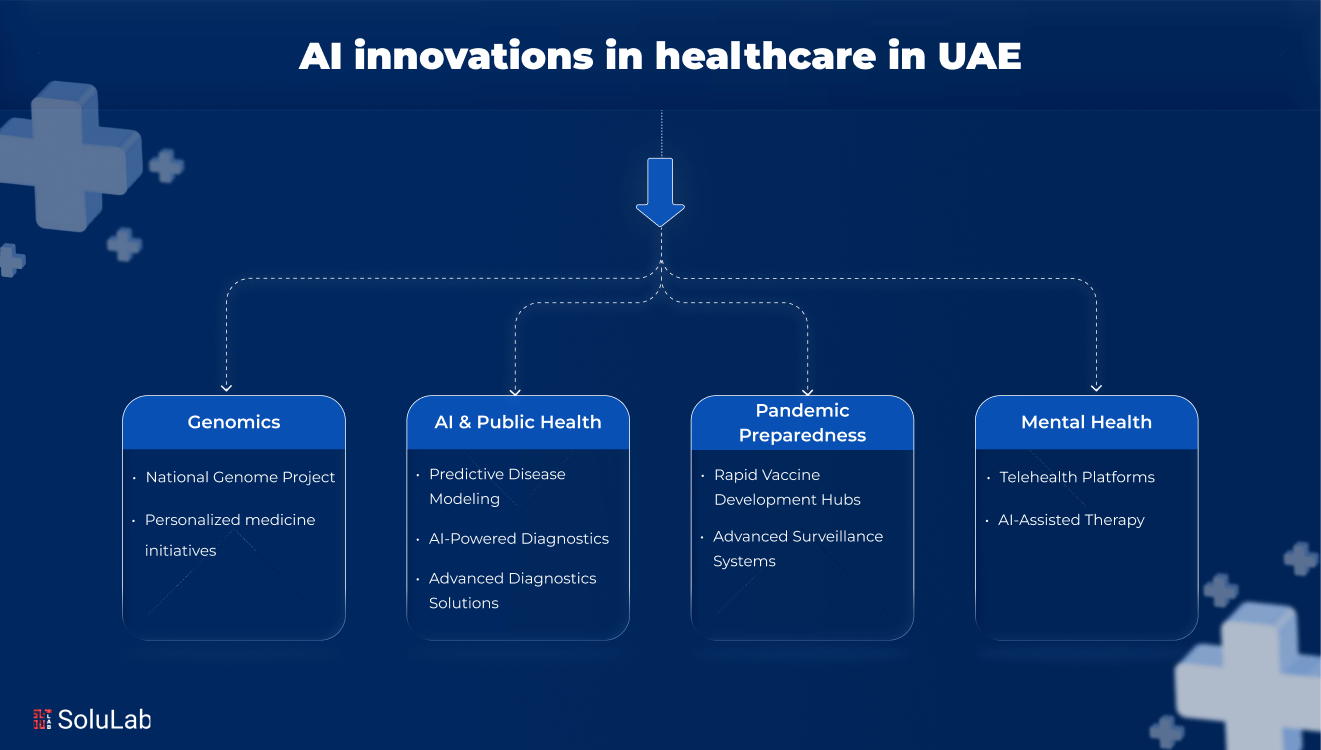
Artificial intelligence isn’t just entering hospitals; it’s taking on real roles in surgeries, diagnostics, hospital operations, and even virtual patient care. In the UAE, this isn’t a concept for tomorrow. It’s already in motion. With a national AI strategy and major investments in digital health, the country is fast becoming a global hub for AI innovations in healthcare.
From AI-powered genomic analysis that predicts diseases early to generative AI in healthcare creating personalized treatment plans, the UAE is redefining modern medicine. It’s all about faster diagnoses, smarter systems, and better outcomes.
So how exactly is AI transforming care in the UAE? What does it mean for patients, doctors, and hospitals? And who’s behind these AI-based healthcare applications? Let’s dive in and find out.
What Makes The UAE a Global Leader In Adopting AI in Healthcare So Quickly?
Because the UAE doesn’t wait for change, it builds it!
While many countries are still drafting AI roadmaps, the UAE has already rolled out a national AI strategy, invested billions into digital health, and made AI a central pillar of its healthcare vision. The leadership is clear: smarter tech means better care.
Add to that a diverse population, world-class infrastructure, and a government that moves fast, and you’ve got the perfect testing ground for AI-based healthcare applications. Whether it’s AI in diagnostics, hospital management, or personalized medicine, the UAE is turning ambition into real, working systems and doing it at record speed.
Game-Changing Medical Innovations for Healthcare in the UAE
From AI-driven diagnostics to culturally tuned mental health tools, the UAE is embracing healthcare innovation at every level. These breakthroughs are not just futuristic ideas; they are real solutions transforming how care is delivered, personalized, and experienced across the country.
Genomics–Powered Personalization
- AI-Powered Polygenic Risk Scoring: Uses machine learning and genetic markers to predict a person’s lifetime risk for complex diseases like diabetes, cancer, and heart conditions.
- Personalized Drug Response Algorithms: AI evaluates genetic variants to predict how patients will respond to medications, reducing trial-and-error and adverse drug reactions.
- Nutrigenomics Platforms: AI-driven systems that combine DNA analysis with lifestyle data to deliver custom diet and fitness plans.
- Cancer Genomics Decision Tools: AI models trained on tumor genomics help oncologists personalize treatments by targeting mutation-specific therapies.
AI-Driven Public Health
- AI Epidemiological Forecasting Models: Predicts potential disease outbreaks by analyzing large-scale data sources like travel, climate, and human behavior, helping governments act early.
- AI-Powered Environmental Health Sensors: Tracks real-time air, water, and soil quality using IoT and AI to flag emerging public health threats.
Pandemic Preparedness
- Wastewater Surveillance with AI Analytics: Analyzes viral and bacterial loads in sewage systems to detect outbreaks before they reach hospitals.
- AI-Enhanced Pathogen Genome Tracking: Uses AI to monitor mutations in viruses (like SARS-CoV-2) during pandemics, enabling rapid vaccine updates and targeted interventions.
Culturally-Tuned AI for Mental Health
- Multilingual Mental Health Chatbots: AI chatbots are designed with cultural awareness, supporting users in different languages and respecting regional values and communication styles.
- AI-Curated VR Therapy for PTSD and Phobias: Combines virtual reality with adaptive AI to deliver immersive therapy sessions that adjust in real time to a user’s emotional and cultural needs.
Read More: AI In Dubai’s Public Services
How AI in Healthcare is Improving Lives in the UAE?

Medical innovation sounds big and technical, but what does it do for people like you and me? In the UAE, the benefits of AI and genomics are already making care faster, smarter, and more personalized. Here’s how:
1. Know Your Health Risks Early
Knowing your risk of diabetes, heart disease, or cancer years in advance, based on your DNA, is now possible. That’s already achievable in the UAE thanks to AI-powered genetic testing. It gives you a chance to make changes early and avoid long-term health issues.
2. Get Medications That Work for You
Ever tried a medicine that didn’t help or worse, made you feel worse? AI in UAE healthcare is now assisting doctors to match medications to your genetic makeup. That means fewer side effects, faster recovery, and no more wasted time on trial and error.
3. Care That Feels Personal
Whether you’re Emirati, Indian, Filipino, or British, healthcare in the UAE is becoming more culturally aware. AI chatbots and wellness apps now speak your language, understand your lifestyle, and tailor recommendations that feel relevant to you.
4. Safer, Smarter Cities
AI-powered sensors in cities like Dubai and Abu Dhabi track air quality and potential health hazards in real time. That means faster alerts about pollution spikes, water safety, or potential outbreaks before they reach your doorstep.
5. Better Outbreak Preparedness
The UAE learned from COVID-19. Today, AI monitors sewage systems, tracks virus mutations, and predicts where illness might spread next. This helps keep communities ahead of the curve so you’re not caught off guard.
6. Smarter Hospitals and Surgery
AI is streamlining hospital operations in the UAE, from smart facility design and patient flow to inventory management and supply tracking. AI-powered robots are also assisting with care tasks, improving efficiency and easing staff workloads.
7. Mental Health That Understands You
Mental health support in the UAE is becoming more accessible and culturally respectful. AI-powered chatbots and VR therapy tools can now recognize emotional distress, offer guidance in your preferred language, and respond in a way that feels human, not robotic.
Read Also: How Founders and Businesses Can Leverage Digital Asset Treasury in UAE?
Ethics and AI Regulations in Healthcare
Let’s be real, AI doesn’t come without ethical baggage. But the UAE isn’t ignoring it. The country is actively shaping frameworks to ensure AI is not only powerful but also responsible.
- Protecting Patient Data in a Connected World: As healthcare data travels across borders, privacy becomes a global concern. The UAE is drafting policies that ensure medical data used in AI systems stays secure, anonymized, and ethically sourced without slowing down collaboration or innovation.
- Building Bias-Free AI for a Diverse Population: AI in healthcare must work for everyone, not just the demographic it was trained on. In the UAE, systems are being audited and stress-tested for fairness to prevent discrimination based on race, gender, language, or socioeconomic background.
- Who’s Responsible When AI Gets It Wrong: If an AI tool makes the wrong call on a diagnosis, who’s liable: the developer, the doctor, or the hospital? The UAE is addressing these grey areas by working on legal frameworks to define accountability as AI becomes more involved in clinical decision-making.
Artificial Intelligence at Every Step of the Patient Journey
AI isn’t just used in high-tech labs or emergency rooms. In the UAE, it’s becoming part of the patient journey from the very first symptom search to long-term recovery.
1. Smarter Symptom Checks and Triage
Many clinics now offer smart digital assistants that help patients assess symptoms and recommend next steps. These tools reduce unnecessary ER visits and connect patients to the right care faster.
2. AI as Your Doctor’s Second Brain
Doctors are using AI to double-check diagnoses, analyze scans, and personalize treatment plans based on real-time data and global research. It’s not replacing physicians; it’s making them faster, more accurate, and better informed.
3. Keeping Tabs on Recovery After You Leave the Hospital
From wearables to mobile apps, AI tracks recovery and alerts doctors if something’s off. This is a game-changer for managing chronic conditions like diabetes, heart disease, or post-surgical recovery, especially in remote areas or busy urban centers.
How SoluLab Can Help Build the Future of Healthcare in the UAE?
All these breakthroughs, like personalized medicine, AI-powered hospitals, and mental health chatbots, don’t happen on their own. They need expert hands to design, build, and scale them. That’s where SoluLab can assist.
As a leading AI development company in the UAE, SoluLab helps healthcare providers, hospitals, startups, and government projects turn ambitious ideas into real, working solutions. Whether you’re looking to develop:
- AI-based healthcare applications
- Custom generative AI tools for diagnostics or triage
- AI-powered patient engagement platforms or hospital management systems
- Robotics-integrated systems for elderly care or surgery support
- Or even a multilingual AI chatbot tuned for cultural sensitivity in the UAE
SoluLab has the technical depth, domain expertise, and UAE-specific healthcare experience to make it happen.
Conclusion
The UAE isn’t just adopting AI in healthcare; it’s actively shaping what the future of medicine looks like. From genomics-powered personalization to AI-driven public health strategies, pandemic readiness, mental health support, and smart hospital infrastructure, the country is building a system that’s faster, smarter, and more human-centered.
By blending advanced technology with cultural sensitivity and real-world needs, the UAE is proving that healthcare innovation isn’t just about machines, it’s about people. And in that vision, AI is becoming not just a tool, but a trusted partner in care.
Get in touch with SoluLab today and start building AI solutions that will shape the future of healthcare in the UAE!
FAQs
1. How is AI improving medical efficiency in the UAE?
AI streamlines hospital operations, automates administrative tasks, assists in accurate diagnostics, predicts patient outcomes, and optimizes resource management, reducing delays and costs.
2. What are the benefits of AI in UAE hospitals?
Key benefits include faster and accurate diagnosis, improved patient outcomes, optimized resource allocation, reduced human error, and better decision-making for doctors and management.
3. Can AI assist doctors without replacing them?
Absolutely. AI acts as a support system, providing insights, diagnostics, and predictive analytics, while doctors make the final clinical decisions, ensuring human oversight.
4. How is AI helping with patient monitoring in the UAE?
AI-powered wearables and remote monitoring systems track vital signs in real time, alerting doctors to potential issues and allowing proactive care, reducing hospital readmissions.
5. How can SoluLab help implement AI in healthcare?
SoluLab builds custom AI solutions tailored for healthcare providers in the UAE. From predictive analytics and smart diagnostics to workflow automation, SoluLab delivers scalable, secure, and patient-centric AI applications that elevate efficiency and improve outcomes.






